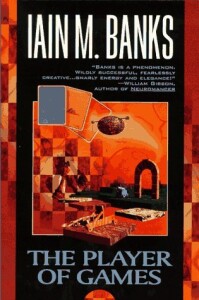 The Player of Games was Iain M. Banks’ second novel of The Culture, originally published in 1988. It already has many of the hallmarks of his truly spectacular later Culture books like Matter and Surface Detail, although the plot is more streamlined and the action less sprawling.
The Player of Games was Iain M. Banks’ second novel of The Culture, originally published in 1988. It already has many of the hallmarks of his truly spectacular later Culture books like Matter and Surface Detail, although the plot is more streamlined and the action less sprawling.
This is the story of Jernau Morat Gurgeh, one of the best gamers in The Culture. It’s a deceptively layered story, something of a game in itself. From the very outset we’re told by the unidentified narrator that all is not what it seems. The story begins with a battle that is not a battle and ends with a game that isn’t a game, we’re told. Just who the book’s title actually refers to is but one of the bits of authorial legerdemaine we’ll contend with as we follow the story.
Banks’s first Culture novel Consider Phlebas introduced us to The Culture through the eyes of a freelance warrior on the other side, who’s fighting against The Culture because he hates what he sees as its smug decadence. The Player of Games takes readers within this ancient and stable civilization and rather subversively introduces us to the Minds who run it. And the games they play as they work to keep it stable and safe. They’re playing a long game of keeping civilizations that are less stable and less peaceful – barbaric, if you will – from posing a threat to the peace and stability of the Galaxy.
Gurgeh is a bit bored with his life, which doesn’t offer him many challenges anymore. Except, he thinks he’s content with that life. He lives on Chiark orbital, one of the immense ringworlds that most Culture citizens live on, if they don’t live on an immense General Systems Vehicle ship, which can be dozens of kilometers long (and nearly as deep and wide) and be home to millions. He’s become quite the homebody, preferring not to leave his beautiful mansion in the mountains, although he occasionally can be coaxed out to play a game. The games are never actually described, but they seem to be some combination of board game and multidimensional computerized or holographic interface.
Most of the trillions of souls – whether flesh-based or created Minds – in The Culture are pretty happy with their lot. Those who are not are often recruited by Contact, which is the civilization’s arm of outreach to non-Culture beings. And a special subset of Contact, called Special Circumstances, is called upon when some sort of dirty tricks are needed to neutralize a threat from one of these alien societies.
Contact has identified such a culture. They’re called the Azad. They’re a very aggressive humanoid society whose culture revolves around a very complex game, also called Azad. Every so often a grand tournament is held and the winners of various rounds accumulate power and influence in Azad, and the final winner becomes Emperor. Contact asks Gurgeh to participate in this tournament as a representative of The Culture, and at first he refuses.
Gurgeh is revealed, little by little, to be something of an asshole. While he is participating in a game against an up-and-coming young female game player, he is persuaded to cheat by a drone named Mawhrin-Skel, in order to try and win the game perfectly, something nobody from The Culture has ever done. He eventually fails in the attempt and the drone blackmails Gurgeh into accepting Contact’s offer of traveling to Azad to play in their game. He spends two years traveling halfway across the Galaxy, during which he obsessively learns how to play Azad the game. The action, which has been a bit slow up to this point, picks up when he gets there and enters the fray.
That’s about all I can say without spoilers. Suffice to say that all is not as it seems. We have a narrator who upfront refuses to be identified and admits to concealing things from us, an unlikeable protagonist, and an opposing empire that (we learn bit by bit) gives barbarians a really bad name. Pay attention to shifts in the narrative technique. The point of view is almost always third person singular, with what I would call limited omniscience. But once in a while it shifts to another person, and that’s when you get some clues about what’s going on behind the curtain.
I think The Player of Games may have been the first Culture novel I read. It was long ago, more than 20 years I think, and I truly remembered nothing about it. I’ve since read all of this series, and have learned enough about how Banks’s universe works that I had a pretty good idea what was going on here and how it would end. That in no way decreased my enjoyment of this book. The climax when it comes is suitably rousing, though not on the scale found in some of the other Culture books. But the denoument is truly delicious. And along the way we’re treated to some of Banks’s trademarked spectacular worldbuilding.
(Macmillan, 1988)
